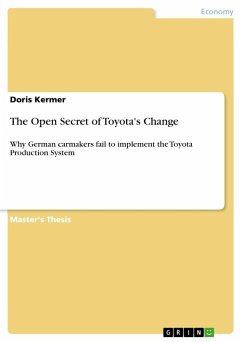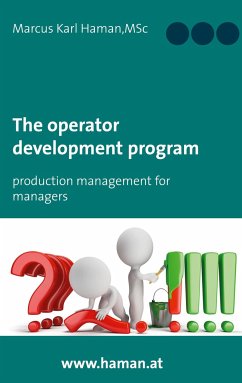Master's Thesis from the year 2006 in the subject Business economics - Supply, Production, Logistics, grade: 1,3, University of Applied Sciences Essen (Institut für Oekonomie & Management Frankfurt am Main), language: English, abstract: This Master thesis explores the organisational change, as performed by Toyota after World War II which, within decades, made this company the most successful automobile producer in the world and a model of corporate governance.Since the Toyota Production System (TPS) was born and continuously developed, it gave such a boost of productivity to the Japanese automobile industry that soon it was copied all over the world. The details of this system, which is to a huge amount based on practical experience and which requires a huge amount of preparatory work, are sufficiently known within the industry. Nevertheless, other Japanese companies and, in particular, international companies fail to catch up with Toyota. The question is, why?Quite a number of car manufacturers already produce according to lean principles, as the TPS instruments are sometimes called, quite successfully, as it seems, and nevertheless they lag behind the performance of Toyota. A highly saturated North American and European automobile market requires thorough change, since companies, due to an increasing global competition, need to undergo some kind of change to survive in the market. Experts assume further consolidation among Original Equipment Manufacturers (OEM) until 2010.Although everything seems to be known about TPS, there is obviously a remainder, because otherwise there would be more "Toyotas" than just one.There must be something in TPS that has not been identified or has been left out so far by the majority of OEMs all over the world. (Judging from the current competition in the automotive industry, it is more likely that this 'something' has been unintentionally ignored). This is the case although the whole system, without any restrictions, is made accessible to competitors and anyone interested in TPS. Obviously, the knowledge of this mostly missing aspect or link in TPS is restricted, because in the current situation in the automotive industry no company can afford giving away any chances.This master thesis aims at identifying and preparing the above mentioned, apparently hidden or unintentionally ignored, aspects of the Toyota Production System (TPS) which make Toyota more successful than other car makers.
Hinweis: Dieser Artikel kann nur an eine deutsche Lieferadresse ausgeliefert werden.
Hinweis: Dieser Artikel kann nur an eine deutsche Lieferadresse ausgeliefert werden.








